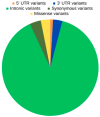Elucidating the Role of OXPHOS Variants in Asthenozoospermia: Insights from Whole Genome Sequencing and an In Silico Analysis
- PMID: 38612930
- PMCID: PMC11012272
- DOI: 10.3390/ijms25074121
Elucidating the Role of OXPHOS Variants in Asthenozoospermia: Insights from Whole Genome Sequencing and an In Silico Analysis
Abstract
Infertility is a global health challenge that affects an estimated 72.4 million people worldwide. Between 30 and 50% of these cases involve male factors, showcasing the complex nature of male infertility, which can be attributed to both environmental and genetic determinants. Asthenozoospermia, a condition characterized by reduced sperm motility, stands out as a significant contributor to male infertility. This study explores the involvement of the mitochondrial oxidative phosphorylation (OXPHOS) system, crucial for ATP production and sperm motility, in asthenozoospermia. Through whole-genome sequencing and in silico analysis, our aim was to identify and characterize OXPHOS gene variants specific to individuals with asthenozoospermia. Our analysis identified 680,099 unique variants, with 309 located within OXPHOS genes. Nine of these variants were prioritized due to their significant implications, such as potential associations with diseases, effects on gene expression, protein function, etc. Interestingly, none of these variants had been previously associated with male infertility, opening up new avenues for research. Thus, through our comprehensive approach, we provide valuable insights into the genetic factors that influence sperm motility, laying the foundation for future research in the field of male infertility.
Keywords: asthenozoospermia; biomarker; oxidative phosphorylation; sperm motility; variant.
Conflict of interest statement
The authors declare no conflicts of interest.
Figures
Similar articles
-
Metabolic Dysregulation and Sperm Motility in Male Infertility.Adv Exp Med Biol. 2022;1358:257-273. doi: 10.1007/978-3-030-89340-8_12. Adv Exp Med Biol. 2022. PMID: 35641874 Review.
-
A variant in sperm-specific glycolytic enzyme enolase 4 (ENO4) causes human male infertility.J Gene Med. 2024 Jan;26(1):e3583. doi: 10.1002/jgm.3583. Epub 2023 Aug 28. J Gene Med. 2024. PMID: 37640479
-
A novel splicing variant in DNAH8 causes asthenozoospermia.J Assist Reprod Genet. 2021 Jun;38(6):1545-1550. doi: 10.1007/s10815-021-02116-1. Epub 2021 Feb 20. J Assist Reprod Genet. 2021. PMID: 33611675 Free PMC article.
-
Genetic underpinnings of asthenozoospermia.Best Pract Res Clin Endocrinol Metab. 2020 Dec;34(6):101472. doi: 10.1016/j.beem.2020.101472. Epub 2020 Nov 6. Best Pract Res Clin Endocrinol Metab. 2020. PMID: 33191078 Review.
-
ADGB variants cause asthenozoospermia and male infertility.Hum Genet. 2023 Jun;142(6):735-748. doi: 10.1007/s00439-023-02546-0. Epub 2023 Mar 30. Hum Genet. 2023. PMID: 36995441
Cited by
-
Integrative Analysis of Whole-Genome and Transcriptomic Data Reveals Novel Variants in Differentially Expressed Long Noncoding RNAs Associated with Asthenozoospermia.Noncoding RNA. 2025 Jan 14;11(1):4. doi: 10.3390/ncrna11010004. Noncoding RNA. 2025. PMID: 39846682 Free PMC article.
References
MeSH terms
LinkOut - more resources
Full Text Sources
Medical


